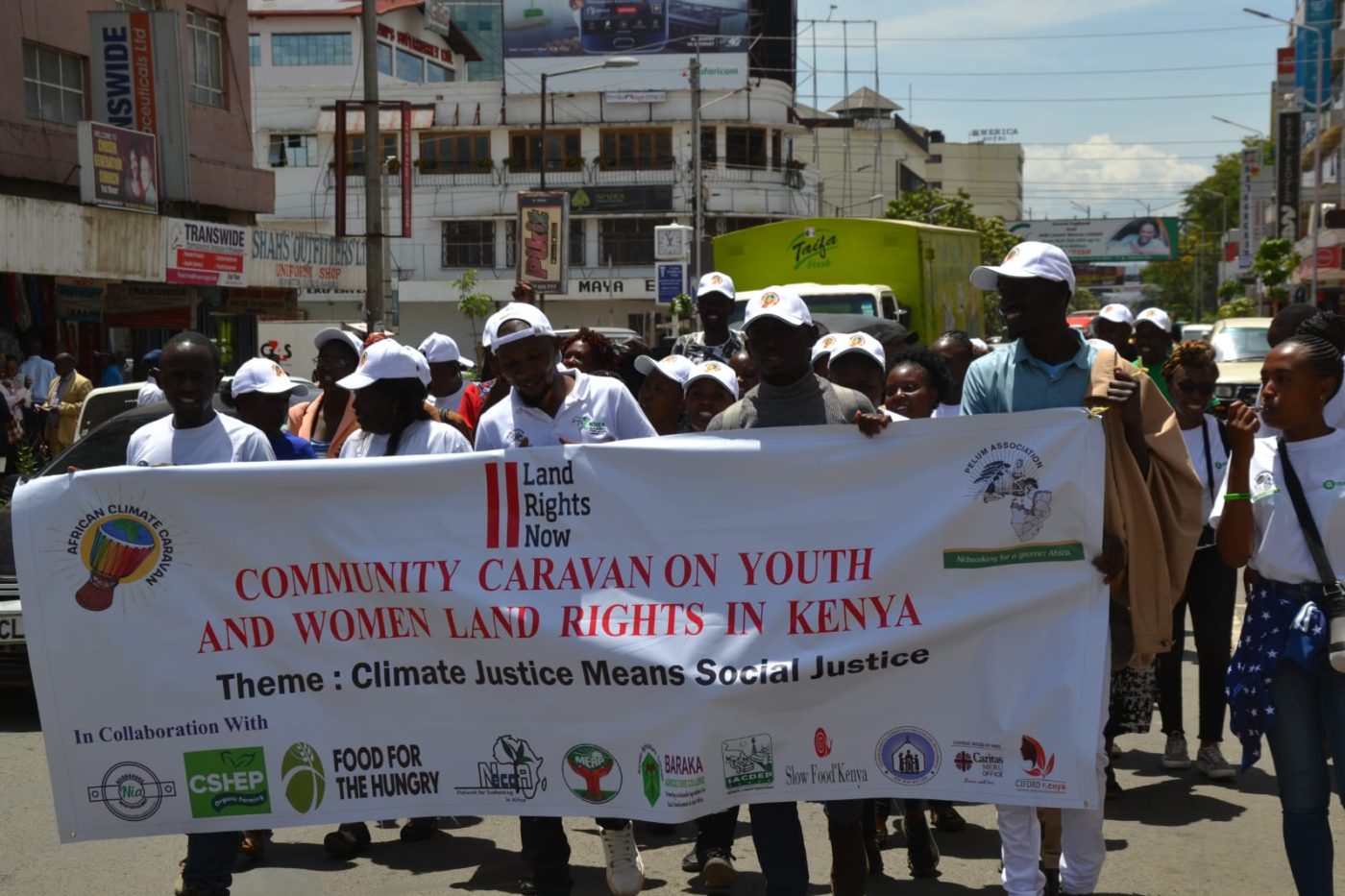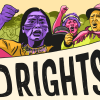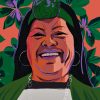This November, global leaders from more than 190 countries will descend upon Sharm el-Sheikh, Egypt, to attend the 2022 COP27 Climate Change Conference. There, representatives will seek collaborative action on an array of issues critical to tackling the climate emergency.[mfn]“Delivering for People and the Planet.” United Nations Climate Action. United Nations, 2022. https://www.un.org/en/climatechange/cop27 [/mfn] Yet after many states failed to meet the commitments agreed upon at the 2021 COP26 Conference in Glasgow, climate activists from resource-poor and vulnerable groups are demanding bolder action from world leaders.[mfn]“COP26 One Year Later: How Much Progress Have We Made?” Global Commons: Climate Change, Policy, and Economics. Earth Org, October 13, 2022. https://earth.org/cop26-summit-progress/ [/mfn] [mfn]“COP27 Q&A.” Human Rights Watch, September 28, 2022. https://www.hrw.org/news/2022/09/28/cop27-qa. [/mfn]
In Africa, the urgency of global climate action, adaptation, and mitigation is particularly acute. Although the continent only contributes 3% of global greenhouse gas emissions, nine out of the ten most vulnerable countries to climate change are in sub-Saharan Africa.[mfn]Ighobor, Kingsley. “COP27 Is Africa’s COP. It Must Address Africa’s Climate Challenges.” Africa Renewal. United Nations, October 2, 2022. https://www.un.org/africarenewal/magazine/october-2022/cop27-africa’s-cop-it-must-address-africa’s-climate-challenges. [/mfn] In these nations, already marginalized communities are suffering the effects of extreme weather events and degraded lands. Ahead of COP27, numerous African leaders have demanded global accountability for loss and damage, equitable access to climate resilient technologies, and climate financing.[mfn]Annor, Ignatius. “African Leaders Call for Climate Action.” VOA Africa, September 23, 2022. https://www.voaafrica.com/a/african-leaders-call-for-climate-action/6760130.html. [/mfn] Yet communities across the continent have organized grassroots action to make their stories of climate impact heard, and ensure that their needs are met in policy this November.
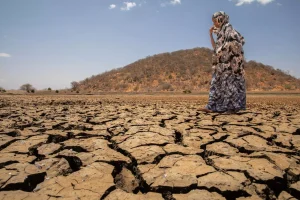
Kenya is currently experiencing its worst drought in 40 years, fueling food insecurity and water shortages throughout the country. Scientists predict that severe droughts will become increasingly common as global warming shifts precipitation patterns. (Photo Credit: Mercy Corps, Source: Aljazeera)
PELUM Kenya is among the organizations seeking climate justice for African communities affected by climate change. The organization is a country chapter of the PELUM Association, a network of CSOs and NGOs working with small-scale farmers in East, Central, and Southern Africa. As a nation ranked fifth among countries most impacted by climate change, Kenya has increasingly suffered from severe drought, vector-borne diseases, and flash-flood events all linked to global warming.[mfn]“10 Of the Countries Most Affected by Climate Change.” Concern Worldwide, July 4, 2022. https://www.concern.net/news/countries-most-affected-by-climate-change. [/mfn] [mfn]Alcayna, Tilly. “Climate Change Impacts on Health: Kenya Assessments.” Climate Centre. The International Federation of Red Cross and Red Crescent Societies, April 2021. https://www.climatecentre.org/wp-content/uploads/RCRC_IFRC-Country-assessments-KENYA.pdf. [/mfn] These climate impacts have in turn driven community displacement, social instability, and the sexual exploitation of women.[mfn]Ibid.[/mfn]
In the weeks leading up to COP 27, PELUM Kenya organized a series of “Caravans for Climate Justice” in their operational zones. These “caravans” acted as mobile campaigns to galvanize stakeholder voices, promote consciousness-raising about climate action, and make Africa’s demands for environmental justice known to the world.[mfn]“Community-Level Caravans to Create Awareness of Land Rights for Women and Youth in Kenya: About Pelum Kenya.” PELUM Kenya, 2022. https://docs.google.com/document/d/1bMtuS2X3Y_9wlkZGAhVBdW3GN9SwxZhn/edit?usp=sharing&ouid=102943832136743233980&rtpof=true&sd=true [/mfn] They also promoted knowledge about the importance of climate justice for women and young people, who are often the most affected by environmental degradation, yet hold the fewest rights to land and resources.[mfn]Ibid.[/mfn] In areas where women have strong property and inheritance rights, entire communities benefit: children are up to 33% less likely to be severely underweight, families devote more of their budget to education, and the women themselves earn up to 3.8 times more income.[mfn]“Land Rights for Women and Youth in Kenya.” Thika: Pelum Association, 2022. [/mfn] These statistics are amplified among young people, who are more likely to engage in family farming when secure land rights are achieved for individuals of all ages and genders.[mfn]Ibid.[/mfn]
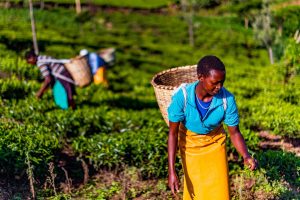
Family farms make up 70% of the rural population in Kenya. Women are central to these small-scale economies, and hold primary responsibility for tending crops and feeding their families. Nonetheless, Kenyan women do not possess strong land tenure and collectively own less than 2% of all titled land in Kenya. (Photo Credit: Sahel Intelligence, Source: Yenkasa and Christian Science Monitor)
Yet significant obstacles remain to achieving equity in these areas. Discrimination based upon age and gender is nearly ubiquitous in customary practice, where males are given preference in the ownership and inheritance of property. Likewise, family law in Kenya is not gender nor age sensitive, and continues to entrench the exclusion of young people and women from agricultural systems.[mfn]Ibid.[/mfn]
PELUM Kenya seeks to promote equitable land tenure through the development of programs which empower women and youth to access land markets and targeted farming opportunities. Further, they seek to strengthen the involvement of all stakeholders in policy-making processes, with the goal of ensuring customary and legal protections for women and youth land rights. Without securing land justice, organizers say, there can be no climate justice:
“We need to [combat] water scarcity, we need food security, and all of these resources are resolved through the acquisition of land.”[mfn]Haki Za Wanawake Na Vijana Zinakiukwa Katika Umiliki Wa Ardhi Kajiado. KTN News Kenya, 2022. https://www.youtube.com/watch?v=u7p3L2t6BMM. [/mfn]
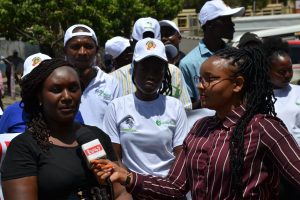
Organizers speak to communities during the 2022 PELUM Community Caravans about the importance of women’s and youth inclusion in land tenure policies and practices. (Source: PELUM Kenya)
When all stakeholders are engaged equally in land justice, it is possible to create inclusive community models of family farming which benefit ecological wellbeing in Kenya and other nations. Critical messages from stakeholders recorded during the Community Caravans will be shared with policymakers at COP27. These messages, and the voices of African youth, women, rural people, and Indigenous communities, must lead climate strategy this November.
The urgency of their demands for are summarized by Doris Gakii, from North Imenti, who participated in the Caravans:
“Women are more affected by climate change since we spend more time than men on farms, searching for firewood for cooking and looking for water for domestic purposes. Unfortunately, many of us are denied the right to own land, yet we know how best to use the land.”[mfn] Mutembei, Phares. “Land Rights Deny Women the Chance to Address Climate Change.” Rift Valley. The Standard, November 1, 2022. https://www.standardmedia.co.ke/rift-valley/article/2001459541/land-rights-deny-women-the-chance-to-address-climate-change. [/mfn]
Follow PELUM Kenya on Social Media: Twitter / Facebook / Instagram
